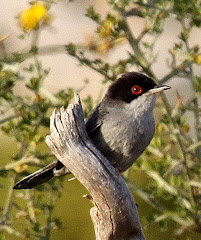Cape Greco is a narrow peninsula in eastern Cyprus running south-eastwards towards Lebanon and Israel and is an important catchment area for incoming migrating birds from the Middle East. Fortunately, it is also protected from development as a nature reserve. In the past, many rarities have been recorded here, most recently last December when a male Hypocolius ampelinus (Grey Hypocolius, a type of Waxwing) became the first record for Europe and for the Western Palaearctic.

Despite the season being rather late, several very interesting birds were seen and photographed here during several visits over the period April 1-4. The terrain is low-lying, rocky and sandy with much scattered scrub and small dense bushes, the latter providing a shelter for the small migrants, especially Warblers. Over these few days, Wheatears were everywhere, the most common being Northern but also Isabelline, Cyprus Pied, and Black-eared.

[Northern Wheatear]


[Isabelline Wheatear]

[Cyprus Pied Wheatear]


[Black-eared Wheatear]
Several Hoopoes were feeding on open ground amongst the sparse vegetation and made a distinctly colourful sight against a background of blue sea and sky.


[Hoopoe]
Cretzschmar’s and Ortolan Buntings were also here as well as Corn buntings, Crested and Short-toed Larks, Whinchats and a solitary female Redstart.

[Cretzschmar's Bunting]

[Ortolan Buntings]

[Short-toed Lark]

[Redstart, female]
A little further inland where the vegetation was somewhat taller a very handsome Woodchat Shrike was found (see separate posting for this) and another pleasant surprise was a pair of Wrynecks with the male frequently displaying.

[Wryneck]
By keeping a patient close watch on the densest bushes, small warblers would be seen to emerge and feed on the insect life. These included Spectacled Warblers, Ruppell’s Warblers, Lesser Whitethroats and Blackcaps.


[Ruppell's Warbler]


[Spectacled Warbler]


[Lesser Whitethroats, pair]
.jpg)




No comments:
Post a Comment